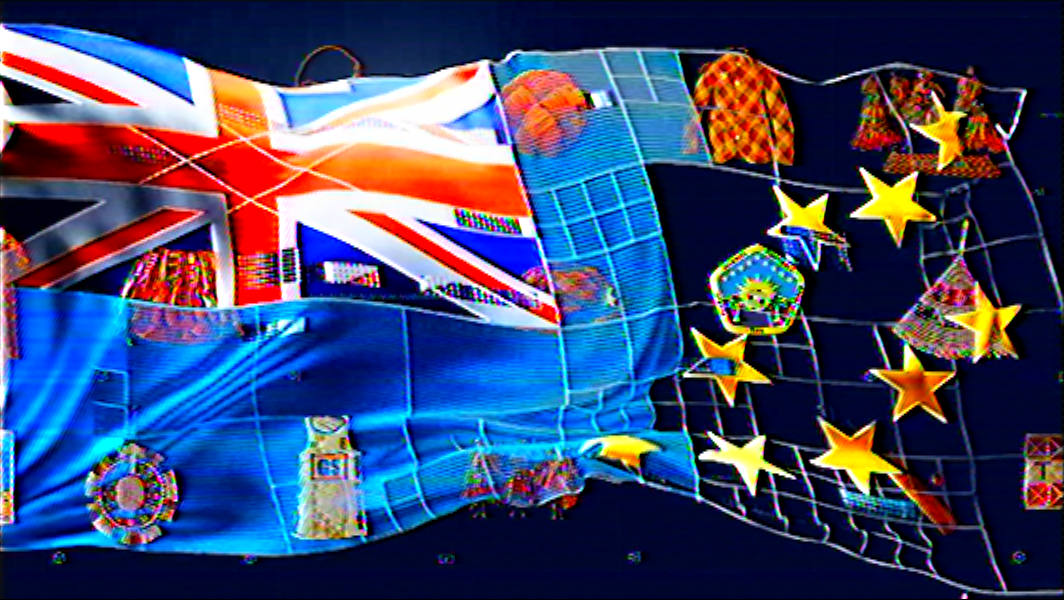It’s Snowing in Tuvalu: A Story of Speculative Nationalism

01: Digital Futures
Sometime in the near future, data centers will be established in the United States and China to house the many digital nations that were once island nations from around the world. These nations, lost to the rising waters of climate catastrophe, are targeted by digital nationalists and cyber-anarchists looking to either wipe out the displaced nations with bombs and guns or steal and recode their nations' histories to a new greatness. A thief in the night steals the data of Kiribati and is the first to commit the crime of nation-stealing. An arsonist burns the data housing Tuvalu, and half of the nation’s records are gone before firefighters can put out the flames. These digital nations aren’t merely abstract geographical concepts but data in hardware. Nations in their most physical and “real” forms, and yet, these are also the most dislocated and unrealisable because the lands that these nations used to cover are no longer habitable. Nationalism is at its most conscious and its most vulnerable in this rising condition.
Here is the rise of not just digital nationalism but also host nationalism and guest nations. The Compact of Free Association, the treaty under which the US Army functions as the arm of monopolized violence for the Federated States of Micronesia, Palau, and the Marshall Islands, is reformulated with additional members, such as Kiribati, Nauru, and Tuvalu, into the Compact of Digital Association. The freely associated states of America change into the digitally associated states of America. The United States agrees to be the territorial host of the digital and physical archives of these nations in its lands in exchange for creating an exclusive economic zone over the waters where the islands used to reside. This transformed the embassies in D.C. into the only physical geography of their sovereignty left. Visit the Marshall Islands embassy and take a virtual tour guided by an AI who looks like the approximate representation of the average Marshall Islander, who takes you on a journey of the nation's history and its people. At the end of the tour, you can look at the gift shop and buy novelty flags and T-shirts. While you buy the gimmicky Marshall Island slippers and hat that says “Make Marshall Islands Dry Again,” ignore the impulse to think about the people who are displaced and forced to work in the US, Australia, New Zealand, China, etc. These unplaceable people are exploited for their unique position as deterritorialised persons waiting on the process of re-nationalization to become citizens of nations that are themselves dying but slower.
In this future, two primary host nations emerge: the US and China. China created its own compact of digital association with the Maldives, Mauritius, and Seychelles. The United States Cyber Force becomes its own branch to secure their digital nations and wider US cyber activities, particularly in the interest of combating the expansion of Chinese virtual territory. The US and Chinese cyber branches fund proxy groups to attain more digital territories. The digital proxy war starts with the Chuuk independence movement resurfacing. This creates the condition for the first in a series of virtual wars between the US and China. The battle of Neo-Weno (the first digital nation conflict) is fought by the Chuuk Cybernetic Revolutionary Force (Chinese-supported) and the Chuuk Cybernetic Defense Force (US-supported), both of which are collections of hackers. The CCRF seeks to reroute the data from the US servers about the Chuuk state to Chinese ones and thus separate it from the rest of the Federated States of Micronesia ES, while the CCDF attempts to counter their every move. Hackers assassinate each other in physical and virtual spaces as they attempt to cut off each other's access. Security teams guarding the hackers shoot at each other across US and Chinese cities, as teams of hackers are housed in their own compounds, launching operations against enemy compounds.
02: The first deterritorial nation
Let’s rewind time for a moment and try and explain this possible nightmare before us. In 2022, Tuvalu Minister Simon Kofe announced that his country would become the “first digital nation” at COP27. This event echoed across time as it created a few fundamental precedents. One, nations lost to rising sea levels (as well as presumably other conditions that make the physical lands of the nation uninhabitable) that digitize their culture and subsequently their sovereignty are called digital nations. Two, Tuvalu is the first digital nation-state, and so, by chronological horror, it means a second, third, fourth, etc., digital nation will come to exist following after. Digital nationalism comes screaming under drowning lungs and water-rushed homes. Retroactively now and forever, these categorized digital nation-states become juxtaposed to the possibly termed physical nation-states. Three, possibly the largest precedential consequence, which will forever change human consciousness’s relationship with nationhood, is that now, by international necessity and law, nations have to be redefined less territorially and more extraterritorially.
In the following year of 2023, Tuvalu passed a constitutional act addressing its new reality. Two passages quoted below will be of particular note:
“The State of Tuvalu within its historical, cultural, and legal framework shall remain in perpetuity in the future, notwithstanding the impacts of climate change or other causes resulting in loss to the physical territory of Tuvalu.” - The Constitution of Tuvalu Act 2023 [emphasis added]
"Nothing in this section prevents an Act of Parliament from proclaiming the jurisdiction of Tuvalu, complete or partial, over any area of land or water or airspace above or prevents a law from having extraterritorial effect in accordance with section 86 (vesting of the law-making power)." - The Constitution of Tuvalu Act 2023 [emphasis added]
These passages (as others not quoted here) attempt to make legal continuities pass territorial ones. Theoretically, this allows for new Tuvalu laws to be passed by their then completely digitized government, which will, in some way, affect their citizens abroad who will have digital IDs. Tuvalu in 2025 continues to push for more nations to address the issue and make an update to the international laws concerning what makes a nation and the parameters that define its sovereignty. So let’s outline those norms and how the digitization of nationalism will affect them. It’ll also be important to, at least, attempt to define what nationalism is and hold that ideal type up against these conditions as well.
The theory for what a state and sovereign nation are in international law rested on four notions as laid out in the 1933 Montevideo Convention on the Rights and Duties of States:
A. Defined territory
B. Permanent population
C. Government
D. The capacity to enter into relations with other states
Let’s imagine it's 2050 and around a dozen island nations are uninhabitable and fully digitized.
A and B are the most obvious issues, as digital nations, by definition, do not possess a defined territory to house a permanent population. C is also difficult because somehow the government has to have some means of consequence for its citizens and has to facilitate the means to enforce and punish violations for any crimes that their citizens commit. D requires C inherently; if you have no government to represent the “legitimate state” of a country, then logically you cannot communicate with other states.
We can run the worst outcome, that of private corporations housing digital nations. Company X rents fifty acres to Digital Nation Y’s population and government. This would, in appearance, fulfill A-D but not exactly. First off, the defined territory is not the digital nation’s sovereign territory, as the final authority rests with the corporation and not the digital nation. The “permanent population,” more a renting population here, is then subject to corporate authority first and the government second, which makes the government and its capability to communicate with other states hampered by corporate discretion immensely. No doubt this all opens the door to aggression by private companies and would presumably be legislated against—the act of renting properties to digital nations for habitation and governance, given that it would violate human rights. The final nail in this future coffin is the simple realization that all corporate private property rests on national lands, and so, by default, any land that the corporation hosts the digital nation would be subject to a physical nation.
The second outcome, that of "Tuvaluization" (a play on Balkanization), is a possible future term for an existing physical nation-state giving a small part of its own territory to a digital nation to re-physicalise that nation-state. Creating an alternative form of breaking up national lands, but instead of it being between rival regional nations, it's non-regional ones being given land. This fulfills A-D seemingly perfectly until we realize that all nations are subject to the harsh conditions of climate change, and any potential land to give to these nations would become immensely more valuable as coastlines recede into the waters. If digital nation A is given land in, say, California, then it's likely that a segment of local Californians would protest this, resulting in the emboldening of regional nationalism.
Either way, establishing the codification of distinguishing between digital nations and physical nations is almost certain. The more official terminology written in laws and documents, as we can predict from Mairne Buckett’s The Nation Ex-Situ, would be Nations in-situ (“nations on-site”) and Nations ex-situ (“nations off-site”). Since the term “digital nationalism” has wider currency as referring to national identities and representation through digital mediums, it is possible that the more specific term “ex-situ nationalism” (off-site nationalism) would gain specific usage when the matters of nations driven “off-site” from their territories due to climate conditions are directly dealt with. So, for example, possible future ex-situ nations and their virtual presence, like the Marshall Islands, would be written out as “The Republic of the Marshall Islands ES” on documents and records.
Protestors, particularly nativistic groups frightened by the existence of ex-situ peoples living near them, would rally and protest for “IS first, ES out” and encourage the creation of in-situ-only laws. Leading to terrifying calls for shutting out any people from the ES governments or even treating them as second-class citizens, and forcing them into a segregated status. On-site nationalism would undergo its own parallel development as it faces the growing population of off-site nations and becomes more and more intimate with its own existential risk of being put “off-site” itself.
We can circle back to our nation hosting speculation from earlier, which isn’t completely unrealistic and without precedent, as ex-situ governments have existed, such as governments-in-exile, which are hosted by allied nations. And a process of international trusteeship exists through UN-administered territories and previously trust territories in the past. Although these are less existentially terrifying given that we're talking about an ex-situ government in one sense and an ex-situ state in the other, but not the literal territorial area being gone. Another example of similar conditions is stateless nations, which lack their own territorial control, be it a nation-state or an autonomous region within a larger one. Here, people continue to imagine themselves as a nation despite the lack of wider international legitimacy or levers of monopolized power. Members of stateless nations, exiled governments, and other cases of displacement are also part of ex-situ peoples, living abroad from their homelands. So in many instances, ex-situ people, governments, and states had/have been hosted under other nations or entities in the case of the UN missions, while nations continue to exist even when territorial control was lacking. But, even here, a defined territory is constant. To break down the union of a defined people-territory simultaneously is the special quality that water-covered digital nations possess.
03: Nationalism as the sovereigntisation of human divisibility
To fully articulate the unique conditions here, we will lay out a definition and theory of nationalism heavily inspired by Benedict Anderson’s Imagined Communities and Cas Mudde’s definitional formatting of populism.
Nationalism is a thin-centered ideology that considers humanity to be ultimately separable into limited imagined communities that determine spatiotemporal belonging—the pure nation and the corrupt foreign—and which argues that politics should be an expression of the sovereign will of the nation.
Thin-centered ideology designates nationalism’s ability to cross the political spectrum of “thick ideologies,” emerging on the far-left and far-right as a broader political platform that requires ideologies like liberalism, conservatism, socialism, and fascism to fill in the appearance, form, and trajectory of what exactly a given national society is ultimately for. A unique aspect of nationalism's "thinness" is its capacity to thrive in depoliticizing societies and even reside in the hearts of apolitical masses as a passively accepted truth that appears as a real texture over the whole world, like the ridges on a wooden floor. Every model globe dotted and lined with national borders put in schools instills the subtle belief in young children that they’re from here and not there, and to imagine other children looking at the same shapes on the map who are part of their oddly outlined space and children who live outside of it.
Nationalism is foremost a form of belief in interhuman divisions; no nation can encompass the entire human population, but it can also encompass, in theory, a majority of them. This divisibility of humanity also means that nationalists imagine the world as a grid and fill pockets of that grid with those “who belong” and those “who don’t.” These divisions divide the human species into, at minimum, members of two distinctly limited imagined communities, both with their own determinate belongings, which define their differences between them. This means that even though nationalism focuses on imagining who their nation is, it also imagines who their nation isn’t. In a way, each nationalism creates not only one community but two.
Nationalists wish their community to be healthy and prosperous by, at least, recognizing these differences and placing socio-political privileges towards their given nation by marking out a historically unique space. Nationalism’s focus on spatiotemporal belonging makes both its internal national community and external foreign community one based ultimately and primarily on the descent of those native or nativised into the area. This gives nationalism a form of horizontal nativity or a mass form of hereditary succession to claims of inclusion and power. If you’re born on the nation’s soil (jus soli) or born from the nation’s people (jus sanguinis), either through literal birth or naturalization, then your children and your national kin, and their children’s children, and so on, are imagined as part of the nation. Ultimately, the nation is a non-consensual community. Even if those naturalized made the decision to join the nation, or those born within it decide to forgo their citizenship, the sovereignty that upholds this fragmentation of humanity rests on a claim that not all of humanity can join because someone always has to fundamentally be on the outside. Whereas membership within religions is based on consent, even though opposing religions exist, it is always conceivable that all of humanity could become members of the faith at any moment, at least within earthly time, if they choose to.
This divisibility of humanity is also the prime source of sovereignty for nations; their final authority in all matters of those who belonged to the “true nation” springs from the notion that humanity cannot, at least for now, form a shared human sovereignty as a single political community and so must rely on nations to decide the legitimate affairs of geo-temporal governance. Two great enemies lurk in the shadows for nationalists, who always have to be fought against by national camaraderie, which attempts to undo this reality of human separatism. The Cosmopolitan, the advocate for unified human sovereignty and political power, and the Tribalist, the advocate for a direct community of familial ties to live autonomously from national sovereignty. All national enemies are despised as members of one or the other. Anarchist? The nationalist calls you a tribalist. Humanist? The nationalist calls you a cosmopolitan. The opposing nations are viewed as optional allies when faced with these two enemies because, at least, an opposing nation understands the importance of power through human separation.
The history of nationalism is both ancient and contemporary, as every nation imagines itself to always have been, while the first nations actually emerged in the late 18th century. The formulation of a nation comes from a concentration of administered language through the officiating of a language through the printed word within regional capitals alongside the physical limitation of human migration in the periphery. The nation’s form is in the simultaneity of two synchronized events: a flattened-out language and a parcelisation of movements into the imaginations of people as they conceive themselves in union with others they will never meet but always know exist. As literacy rates rose and movements became upscaled through transportation developments, while at the same time inequalities in movements obstructed and complicated the transportation of people, this led to people imagining smaller and larger nations at the same time, while also reimagining existing nations in new forms. Nationalism comes from reimagining sovereignty from a vertical kingship to a horizontal camaraderie and viewing humanity as inherently limited by spatiality across time. Each nation exists to impart the idea that people cannot move anywhere and instantly belong and that they must instead reduce their own physical and mental complexities to accept territorial simplicities as the only true means to measure “authentic human populations” and their “rightful” placements.
The movement of the national spirit can be personified in four leaders, each with a powerfully mythical legacy of their own: George Washington, Napoleon Bonaparte, Joseph Stalin, and Adolf Hitler. The Washington-Bonaparte phase of national heroism exhibited the idea that to be national was to be liberal, a liberator of the people for universal values through historical time. The principal argument used for expansionism across the American and European continents by the national spirit of Washington-Bonaparte was that they were on a “civilizing mission” to remove old dynasties and “barbaric peoples” with national communities. The Stalin-Hitler phase of national heroism exhibited the idea that the nation and the national subject played a part in ending the liminalities of demo-history (temporality as the domain of the demos) and could, if harnessed enough, blast forward a new utopian time.
Hitler’s efforts created the maximal logic of a global-national “Aryan super race” to finalize the metanarrative of racial competition via world empire. While imagining the world as territorially controlled by these “supermen,” even in this world, humanity is still divisible, as “inferior peoples and traits” would constantly be attacked. No matter the full extent of global control within the Nazi imagination, they still don’t see themselves as a unified human race because an aspect of the inferiority of these “others” is that their blood comes from the “decadent soils,” which for them can only be useful as breeding grounds for Aryans.
Stalin’s contribution to maximizing national logic was becoming the founding father of transitory nationalism. It allowed for the co-existence of extreme nationalism and communist convictions by arguing that the transitory period for the nation could host a form of nationalism where the “pure” national community would comprise those whose local cultural authenticity belonged to those who also exhibited the virtues and traits of toilers, be they proletarians or peasants. Filling the nation with both the most locally authentic and internationally potent. This toiler nationalism (the particular form of transitory nationalism here) was definitional to Marxism-Leninism, as it helped to spread nationalist development in decolonizing continents. The result of the Stalin-Hitler phase of national heroism was the ruination of nationalism and its rehabilitation. Fascism had tainted nationalism as a dirty word inseparable from catastrophic bloodshed against minorities, while Marxism-Leninism had rehabilitated it as a word synonymous with self-determination for many of those same oppressed people that the Nazi regime had targeted.
In the post-Soviet world, the national spirit’s heroism is faceless (or perhaps is wearing too many faces to catch a clear glimpse at) as post-sovereignty shifts into the focus of international tensions as inter-governmentality and supranationalism reach their heights in the 1990s to 2000s, most notably, the rise of the European Union’s use of pooled sovereignty to override individual member nations regarding certain decisions and actions. Allowing for conditional open borders between citizens of EU members. The response to this has been waves of left and right national populists seeking to reduce and outright destroy this pool and resituate the international community as a safe haven for individual nations to engage in democratic genocide. But these majoritarians have no effective means to deal with a receding coastline, no matter how much they brute-force waves of mobs into government buildings. Any other means of human receding into smaller communities has to deal with the tides and blistering heat eventually or face absolute extinction. The resurgence of Rousseauian politics (unreal politik) on the political left and its twisted form on the right ends in the sovereign assemblies drowning in their own silent uniformities.
The post-national right has a clear face in this post-Soviet era; its spirit’s heroism charges into battle with a Laden-Yarvin smile, which screams for global sovereignty of martyrs at one end of its mouth and atomized sovereignty of entrepreneurs at the other. The digital nation would be blasted and privatized into oblivion by his watch, as its populace is turned into warriors for self-sacrifice or “royals” for bitcoin. This era of ideology, which has become host to majoritarian hyperterritoriality and minoritarian deterritoriality, is one of graveyards filled with ghouls feeding on the marrows of long-dead skeletons to find a release from the intense liminal conditions of late modernity. Nevertheless, at the end of the day, we’re all ghouls seated at the dining hall of past generations. Let’s finalize this piece with a speculative means to “positive” post-national ghoulish sovereignty and then tip off with anarcho-ghoulish wisdom.
04: Unimagined Communities
Any higher-order sovereignty to come out as a means to save humanity from its dire climate situation would require a species-wide form of cooperation, which would come to regard nationalism in retrospect as a form of intraspecies segregationism. The same conclusion was reached by anarchists, who looked into nationalism internally and came out the other side critiquing even its most friendly nations as ultimately a violation of human freedom by demanding that human limitations of movement be given political power.
A speculative fix for those believing in political power could be to "pool the pooled sovereignty," if you will, into a natatorium-like community of "sovereignty of many swimmers" around a polity defined more by habitability than by territory, an ecumene. Essentially, nation-states are subsumed under a natatorian-ecumene. Nations would remain ceremonially as ancestral ties, but the holder of politics would be in how the natatorian “re-routes roots,” as did the nation when it came to replace the dynastic realm. "Roots" here means a stable place of birth, and "routes" refers to the distances of mobility. Putting an "ES" or even an "i" in front of a virtualized government does not effectively solve the problem, because the issue here for statists is a lack of higher sovereignty over the nation-state to address deterritorializing problems that nation-states cannot solve.
Let’s take the six most integrated European Union nation-states, the core: Belgium, France, Germany, Italy, Luxembourg, and the Netherlands, and suppose they form the first Natatorian-Ecumene, calling it officially the Sanctuary Republic of Eurohumanity, but unofficially calling it the Eurohuman Republic or “EurRep” for short. Its internal workings are administered by a habitat government, neither civilian nor military, but transcending both, as is the government selected by “Habinauts.” Basically, a two-tiered citizenship is formed: the “swimmers,” those with maximal freedoms but who can’t hold an elected office, and the “habinauts,” those with minimal freedoms, such as being under constant surveillance, but who can hold office. A “swimmer” becomes a “habinaut” through a “performance of civic duties,” either by petitioning local leaders to recommend them or engaging in over ten thousand hours of community service. Headed by an executive council called the humane administration, composed of a chief administrator and five associate administrators; a unicameral legislature of five hundred and one delegates making up the spatial assembly; and a judiciary of seven judges, the court of conservation. Its motto stamped on government currency and symbols, “Humanitas in Communi Habitat,” means “Humanity in Shared Habitat.” This “Eurohumanity” is a post-national civic humanist identity. Political parties are outlawed, and a government amendment outlines that all governing officeholders must represent themselves as secular and non-ideological, but there is an official culture, called habitatism, with festivities and holidays celebrating “the flow and adaptation of swimmers” in the summer and the “anchors and preservation of habinauts” in the winter.
All citizens of the nations within the transcension of sovereignty are made the “original swimmers,” but new citizens can only be natatorianised through showing a jus natandi, a right to swimming, by moving throughout the habitat and providing to it without committing malice for two years; then they can become a citizen, aka, a swimmer. The spatiality would be an expanding area of “habitability,” transforming lands and seas into functional spaces for human survivability and proliferation. Territory is shifted from constants in recession towards flexibilities in accession, and population is shifted from permanence of position to permanence of action. Using the combined resources to make decisive moves to try and save humanity from future climate catastrophes. The EurRep serves as a welcoming place for the ex-situ peoples in our speculative future. While China and the US play war games with virtual government data and maritime economic zones, the majority of the living humans from digital nations could find a new sovereign home there.
Let’s come to face something: digital nations aren’t “real nations”; they’re the ghosts of nations that used to exist physically but now are the remains of once-living lands that reside within virtual spaces. Post-digitized generations of these ghost nations will inherit the tradition of logging into a virtual world to take part in rituals and education of lands that only their parents knew. The memory and identity of what it means to be a Tuvaluan become merged with this virtual space. When you say “I am Tuvaluan,” others will not think of islands on a map but servers in code, and those who self-identify will come to think the same. The experience of nationalism in this way becomes ceremonial and is a sign that the nation as a polity has lost its weight on the human mind. Much like how the emergence of nationhood made the dynastic realm a fantastical relic of a past, often portrayed with wizards and dragons in fiction, the nation, too, enters into this fantastic space of unreality. Medieval fantasy becomes industrial fantasy. Physical nations exposed to these national phantoms will feel themselves start to rot, as the imaginations of even the largest and “safest” nations have to face the idea of a non-territorial people as conceivable and even, perhaps, preferable, as to survive the worsening climate catastrophe requires deeper international cooperation and the idea that humanity must willingly go beyond the territorial and seek a thriving extraterritoriality to combat the rushing waters.
For those opposed to political power, anarchists, we already have our own counterproposal, the non-sovereign extraterritoriality, to rally together for what we call free association. It views nationalism as not only intraspecies segregation but also views sovereignty as intra-human aggression. Free association can go higher than any nation-state or natatorian ecumene by calling for the liberation of all sentient life from the oppressions of human political authorities and earth’s unconsciousness by expanding consciousness to the earth itself. No longer must we fear environmental catastrophe or force ourselves to subordinate to some abstract idea of “limits” when we make the plants, animals, and ground aware and rally to our cause.
In the future, the great-grandchild of Tuvalu logs in to the Tuvaluan Christmas celebrations as a blizzard piles on outside their D.C. windows; as a gesture of hyperreal fun, a light fall of snow touches down on virtual beaches of Christmases long past. It’s snowing in Tuvalu.
Sources and further reading:
- The First Digital Nation COP28 Update (https://www.youtube.com/watch?v=m0KoYarxX3E)
- The Constitution of Tuvalu Act 2023
- Montevideo Convention on the Rights and Duties of States, 1933
- Maxine Burkett - The Nation Ex-Situ: On climate change, deterritorialized nationhood and the post-climate era
- Benedict Anderson - Imagined Communities





